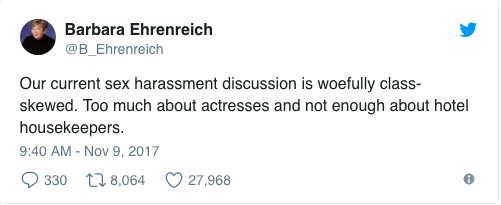labor Barbara Ehrenreich: Worker Abuse Is Rampant, and Sexual Harassment Is Just the Start
Barbara Ehrenreich has written extensively about the impossibility of getting by with low-wage work in the U.S. and the everyday indignities workers in the U.S. face on the job. In her best-selling book Nickel and Dimed: On (Not) Getting By in America, Ehrenreich wrote about her yearlong experience of going undercover as a low-wage worker. In a follow-up, Ehrenreich explored the world of middle-class white-collar jobs and the insecurity and humiliation of the jobs available to workers who did everything they were supposed to do to live the American dream. She’s also written about the growing inequality between rich and poor in This Land Is Their Land and the false promises of “positive thinking” in Bright-Sided. Ehrenreich is the founder of the Economic Hardship Reporting Project, which promotes journalism about inequality in the United States.
Last week, Ehrenreich chimed in on the ongoing revelations of sexual harassment in the entertainment industry with a tweet:

I asked her to expound on the conversation she wishes we were having and the cases not being covered. Our conversation has been edited for clarity.
Haley Swenson: Did you have a particular case in mind that wasn’t being covered when you wrote your tweet?
Barbara Ehrenreich: Well, one case that comes to mind was the allegations against Dominique Strauss Kahn made by a hotel housekeeper. But I was also thinking about the numbers found by the hotel housekeepers union in Chicago, Unite Here. They found a shocking number, almost 60 percent of hotel housekeepers, reports being sexually harassed on the job. They go up to somebody’s room and there’s no one else there, and some guy tries something or is there with no clothes on while they try to do their jobs. This is routine.
And the other big category of workers we should talk about are waitresses. A waitress has to be prepared basically all the time to hear remarks on her body. And I have experience with that. I worked as a housekeeper for [Nickel and Dimed] and earned $6/hour. But I also worked as a waitress for the book, and I was a waitress when I was in my late teens. I was much prettier then—though I’m not sure what that has to do with it. It happened all the time. The worst thing is a pat on the butt. And waitresses talk to each other—we’ll say, “Hey, watch out for that one,” but it’s thought of as just a part of the job. It’s like, “Well, do you want a tip?”
The other thing we need to start talking about are just everyday instances of harassment that don’t meet the standard of sexual harassment that happen to people in their jobs. I wrote about this case in my book This Land is Their Land, where a sales company would motivate their employees by spanking both men and women who didn’t meet their quotas. They’d stand them up at the front of a room and use a giant ruler. And it was brought to court by a woman, but it was decided this wasn’t sexual harassment because it was happening to both men and women.
There was another employer I wrote about in Bright-Sided that was actually waterboarding employees who didn’t perform well. As part of a motivational exercise, a salesman was held down and had water poured down in his mouth and nose. You know, they can do pretty much what they want to you, and if you want the job, you just shut up.
I experienced other kinds of harassment when I was working on Nickel and Dimed, which were not sexual but were damn irritating and painful. When I was working as a waitress, my supervisor made me clean the whole floor of the restaurant, which was quite large, with a broom that was very short, like the notorious short hoe used by agricultural workers. So I was forced to do this whole job bent over too much. This left my back in pain. And then there was a supervisor who was mad at me because I was too friendly with the dishwasher, who was a Czech immigrant—I was helping him learn English. And so her punishment for me was I had to stay after work and mix all the blue cheese salad dressing and refill ketchup bottles for the next day. My shift was over, so I wasn’t being paid. I couldn’t go home. It was like I was being kept after school.
I mean, I’ve written about this. Stuff like this is basically old news. So with the issue of harassment—race-based harassment, harassment like this—sexual harassment is part of a larger pattern in the abuse of working people.
I have to imagine this has only gotten worse since the 2008 financial crisis since everyone is worried about losing their jobs?
Oh, yeah. I think you’re right.
So why do you think that these stories about celebrities are getting so much attention? Why is there so much interest in talking about this with celebrities and not these other routine, everyday cases people face?
Well, I think you know. If you're in the journalism business, you know that celebrities sell. You watch all these celebrity women come forward in the Harvey Weinstein case kind of glamorize the whole issue.
That’s something that could run in People magazine or in Us. That's sensational. The waitress or the hotel housekeeper or anybody who is a low-paid worker and isn’t being well–taken care of by her employer are the more quotidian examples.
But isn’t there a chance that the attention these celebrity cases are getting could, I hate to use the phrase, but, could have a “trickle-down effect?” Maybe the new conversation on celebrities could change the environment for women all over?
Sure. Yeah, of course. But I think the time has come to make that shift to the structures or nothing will ever happen. Celebrities: I’m sure there’s more to come. But it’s time to shift and say that there are all these other cases out there, and these are things that happen to your sister, or your daughter, or your wife at work. It’s routine.
So one of the conversations taking place is that there’s something about the structure of these industries—especially Hollywood and politics—that makes it really easy for men to prey on women. What kinds of things should we think about when it comes to hotel housekeepers or waitresses that are structurally making it hard to stop sexual harassment in those contexts?
The problem is these are women who often work alone and they have no backup. So, we need a kind of feminist movement to change this and give them safe places to stand up and talk about these conditions. A good model of this is the National Domestic Workers Alliance.
Domestic workers are also very vulnerable. There’s a case of taking women who are very often working by themselves, working in people’s homes with nobody around to turn to or witness what’s going on, and organizing them together. At this time we have to use the momentum from the celebrity cases to talk to the women showing up to work with a mop and a vacuum cleaner and facing these much more routine problems.
It seems the law is really not working to solve these problems. So what is the solution to these everyday kinds of harassment?
Well, the unions. Absolutely. Most people have no rights whatsoever in their workplace. You have a little bit more power with our current unions, but you know, we need stronger unions. We need it to be that if it happens, you report it to your lovely shop steward and they immediately come in and confront the employer about it. This is exactly why I’m for strong unions.
Better Life Lab is a partnership of Slate and New America.
[Haley Swenson is the editor of the Better Life Lab at Slate and an ACLS/Mellon Public Fellow.]


Spread the word